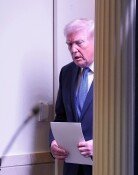[Editorial] Kim Byung-jun Is Also Heading in the Wrong Direction
[Editorial] Kim Byung-jun Is Also Heading in the Wrong Direction
Posted August. 05, 2005 04:58,
Since the departure of Chairman Lee Jung-woo of the Presidential Commission on Policy Planning, much attention has been paid to the role of Kim Byung-jun, the chief presidential secretary for national policy. Kims recent remarks in various articles, interviews, and lectures, however, have been sufficient to suggest that he is busy trying to fit into the keynote of President Roh Moo-hyun.
The press, which has strong agenda-setting power, has failed to do their role. This is why some crucial agendas are not being highlighted in our society, criticized Kim at a recent seminar. The formulation of national agendas is not a task whose failure cannot solely be blamed on either the government, the press, or civic society. Only when the three recognize and complement each other can agendas be set properly. The failure of setting national agendas is largely attributed to the government, who considers the press, the bridge between the government and people, as its adversary.
So far, the press has continuously urged and asked the government to boost corporate investments, implement market-friendly pragmatic policies and secure constitutional values in an effort to reinvigorate the economic growth engine. It would be rather honest of Kim to confess that he did not like such agendas presented by the media. Otherwise, he should reflect on himself who has been incapable of realizing these agendas into policies.
In an interview two days ago with Cheong Wa Dae Briefing, a newsletter released by the presidential office, Kim claimed that the wrong electoral system and regional politics are the main culprits of everything from intensifying bipolarization to the financial crisis and even the collapse of the Seongsu Bridge. As a high-ranking government official, the presidential secretary might face quite a few pressing policy agendas regarding the economy and the peoples livelihood. Against this backdrop, it is questionable whether he can win a public consensus if he continues to plead the electoral system and regional politics as excuses.
The governments economic policy failure has been widely criticized by the public, as demonstrated in remarks from vendors in traditional markets and taxi drivers on the street, as well as results from opinion polls. Policymakers can never deliver hope to the people they serve unless they recognize their inabilities and failures and stop blaming everything on newspapers and the existing systems.
Some bitter advice for Kim is this: Rather than continuously saying what represents the Presidents position, make every effort to restore the governments normal agenda-setting functions.







